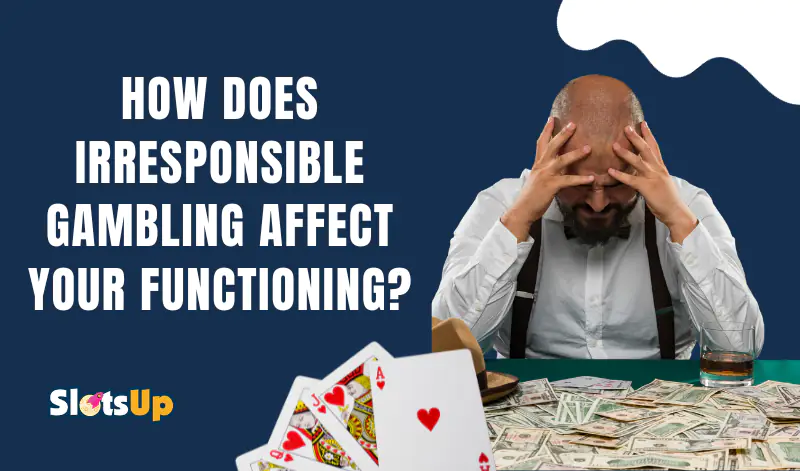
How does irresponsible gambling affect your functioning?
Gambling has been around for a while. For centuries, and perhaps thousands of years, people gambled for fun and joy, but also often to their ruin. Having already explained the difference between responsible and irresponsible gambling, in this article, we’ll focus on the repercussions of irresponsible gambling and just how detrimental gambling can become, both for you as an individual and for your family and friends.
Downsides of irresponsible gambling: symptom by symptom breakdown
When people take gambling too far, it becomes a mental disorder called gambling disorder (gambling addiction). Irresponsible gambling is just one step away from a full-blown gambling addiction, and many irresponsible gamblers move on to develop a gambling disorder.
We’ll now give a short description of the most critical functional consequences of irresponsible gambling and how it affects you and your loved ones. In another article, we’ve covered the symptoms of gambling disorder in-depth.
1. Gambling tolerance
Initially, while you’re still gambling responsibly, you may do it only occasionally and only invest a little bit of money. However, as gambling enters into the irresponsible spectre, it starts taking away too much of your time and money because you need to invest more time and money to get that initial thrill. No longer is it fun to throw away $5 and see what happens. You must raise the stakes and gamble for increasingly long periods to get that well-known thrill.
This is somewhat similar to any other addiction. Initially, doses are low and occasional, and gradually, your appetites get bigger and bigger until your whole life revolves around gambling.
2. Withdrawal
If you’ve developed an irresponsible gambling habit, chances are you’ll feel somewhat alarmed when you stop gambling for a while. You may feel depressed and empty, on the one hand, or nervous and restless, on the other, or all this together. Irresponsible gambling (and many other bad habits) fills a significant gap in people’s minds and souls. When you remove the bad habit, all the suppressed emotions and thoughts come back to light, and you have to face them again.
3. You cannot curb your gambling habit.
You may have realized that something was wrong long ago, even attempting to curb your gambling habit without much success. Perhaps you’ve managed to stay away from gambling for a month or two, but you always get back to gambling, and not only that, but you quickly get back to the spectrum of irresponsible gambling.
You may have identified a pattern: you stop gambling, and very quickly, you start experiencing intense boredom, emptiness, restlessness, etc. Then this thought occurs to you: “I’ll gamble just a little bit to break out from this routine. This time, it will be different; I’ll do it responsibly.” And then, instead of staying true to your word, after a month or two of responsible gambling, you get back to the old ways.
4. You rely on friends and family to escape nasty financial situations.
If you’re gambling irresponsibly, sooner or later, you’re going to have to ask your family members or your friends to lend you some money. It’s inevitable. Now, it’s not a problem to ask your loved ones to lend you some money, but it’s a problem if you’re throwing others’ money away on gambling. That’s the most significant issue here: you’re not taking money to invest it in something brilliant. Chances are your friends and family will know a thing or two about your irresponsible gambling, so you’ll have to lie and cheat to get the money you need, which brings us to:
5. You ruined a meaningful relationship because of gambling.
Addictions always ruin social relations. Your loved ones won’t be able to watch you sink deeper and deeper without trying to pull you out. On the other hand, you may think that everything’s okay, and you may want to pursue your habit. Or your loved ones may realize that all the money you lent won’t be returned and that you’ve been lying about where you’re spending your money for a long time. Finally, if your gambling is extremely irresponsible, this means you probably brought your whole family to a very precarious financial situation.
This is the perfect ground for serious interpersonal conflicts, whether at home, with friends, or at work. Another reason why your relationship may suffer due to gambling is because you’re thinking so much about gambling that you neglect important aspects of your life, such as friends and family.
6. Chasing your losses
Another sign of irresponsible gambling is chasing your losses. This is when you, for instance, lose $100 on a casino game, and you’re so sure that you will return your money if you keep gambling that you continue investing large sums of money just to get back to zero.
What often happens here is that you enter a gambling spree that might last for hours; quite often, people spend whole nights in casinos.
Hitting rock-bottom: Irresponsible Gambling and Family
The worst thing about irresponsible gambling is that you’re slowly drawing your family and friends inside the dangerous and ruthless world of lies and debt. The worst-case scenario is borrowing money from shady individuals who threaten you and your family to extort as much money as possible when the payday comes.
This should be your most significant motive to avoid irresponsible gambling. Not only can it eventually destroy your life, but it also has the potential to destroy the lives of your loved ones.
Conclusion
Irresponsible gambling will quickly lead to the development of gambling disorder. It’s not something you should take lightly. As you’re entering the world of irresponsible gambling, so are your loved ones, whether you like it or not.
Fortunately, most people can gamble responsibly, provided they’re careful about their actions and make sure they don’t spend too much money on gambling and don’t gamble too frequently. We’ve addressed how you can gamble responsibly in another article, and we encourage you to check it out and learn how to gamble in less dysfunctional ways.






